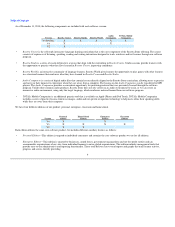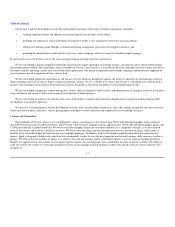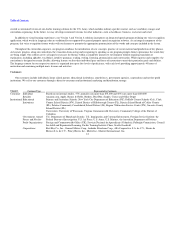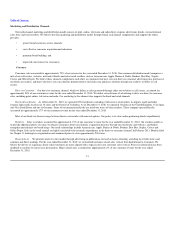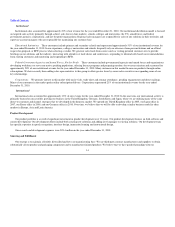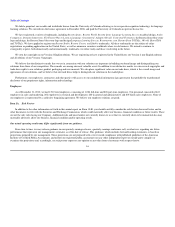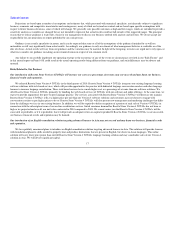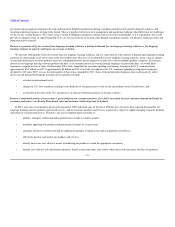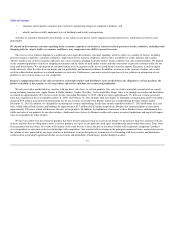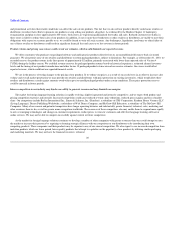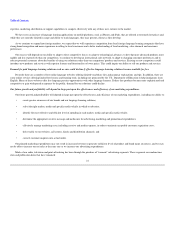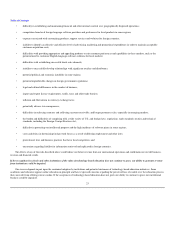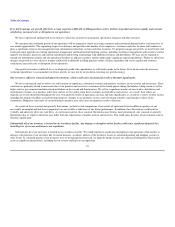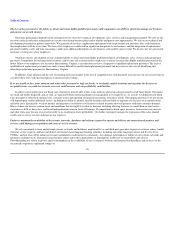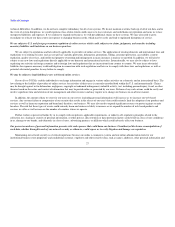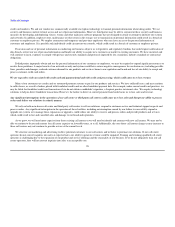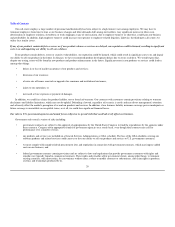Rosetta Stone 2010 Annual Report Download - page 21
Download and view the complete annual report
Please find page 21 of the 2010 Rosetta Stone annual report below. You can navigate through the pages in the report by either clicking on the pages listed below, or by using the keyword search tool below to find specific information within the annual report.
Table of Contents
anticipate and respond to consumer price sensitivity and pricing changes of competitive products; and
identify and successfully implement ways of building brand loyalty and reputation.
A decline in consumer demand for our solutions, or any failure on our part to satisfy changing consumer preferences, could harm our business and
profitability.
We depend on discretionary consumer spending in the consumer segment of our business. Adverse trends in general economic conditions, including retail
shopping patterns, airport traffic or consumer confidence, may compromise our ability to generate revenue.
The success of our business depends to a significant extent upon discretionary consumer spending, which is subject to a number of factors, including
general economic conditions, consumer confidence, employment levels, business conditions, interest rates, availability of credit, inflation and taxation.
Adverse trends in any of these economic indicators may cause consumer spending to decline further, which could hurt our sales and profitability. We depend
on the continued popularity of malls as shopping destinations and the ability of mall anchor tenants and other attractions to generate customer traffic for our
retail mall-based kiosks. We also depend on continued airline travel to generate traffic for our retail kiosks located in airports. Decreases in mall or airport
traffic adversely affect the sales from our kiosks and our profitability and financial condition. In addition, an increase in the taxation of online sales could
result in reduced online purchases or reduced margins on such sales. Furthermore, consumers may defer purchases of our solutions in anticipation of new
products or new versions from us or our competitors.
Because a significant portion of our sales are made to or through retailers and distributors, none of which have any obligation to sell our products, the
failure or inability of these parties to sell our products effectively could hurt our revenue and profitability.
We rely on retailers and distributors, together with our direct sales force, to sell our products. Our sales to retailers are highly concentrated on a small
group, including Amazon.com, Apple, Barnes & Noble, Borders, Staples, Best Buy, Costco and Office Depot. Sales to or through our retailer and distributors
accounted for approximately 18% of our revenue for the year ended December 31, 2010, which was down approximately 3% from our revenue generated
from these channels for the year ended December 31, 2009. On February 16, 2011, Borders filed for Chapter 11 bankruptcy reorganization and we recorded a
charge of $0.9 million associated with the potential loss of our accounts receivable from Borders which was recorded during the three-months ended
December 31, 2010. In addition, we changed the accounting for revenue and bookings for the three months ended December 31, 2010 for Borders on a cash
basis, which reduced both revenue and bookings by approximately $1.7 million and $2 million respectively. Borders also announced plans to close down
approximately 200 stores, which will decrease the sales of our products. In addition, the liquidation of inventory at these Borders stores could diminish foot
traffic and sales of our products by our other retailers. Additional store closures by Borders could result in more inventory liquidations and negatively impact
sales of our products by other retailers.
We have no control over the amount of products that these retailers purchase from us or sell on our behalf, we do not have long-term contracts with any
of them, and they have no obligation to offer or sell our products or to give us any particular shelf space or product placement within their stores. Thus, there
is no guarantee that this source of revenue will continue at the same level as it has in the past or that these retailers will not promote competitors' products
over our products or enter into exclusive relationships with competitors. Any material adverse change in the principal commercial terms, material decrease in
the volume of sales generated by our larger retailers or distributors or major disruption or termination of a relationship with these retailers and distributors
could result in a potentially significant decline in our revenue and profitability. Furthermore, product display locations
19
•
•


